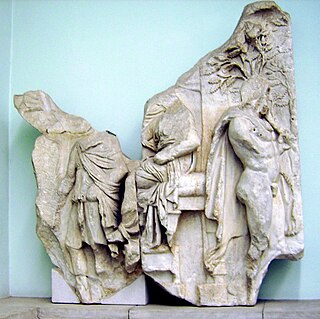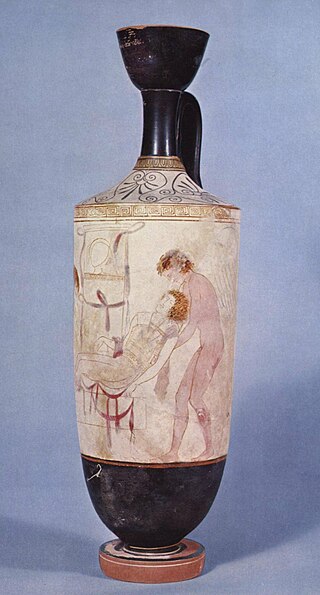Related Research Articles

In Greek mythology, Agamemnon was a king of Mycenae who commanded the Achaeans during the Trojan War. He was the son of King Atreus and Queen Aerope, the brother of Menelaus, the husband of Clytemnestra, and the father of Iphigenia, Iphianassa, Electra, Laodike, Orestes and Chrysothemis. Legends make him the king of Mycenae or Argos, thought to be different names for the same area. Agamemnon was killed upon his return from Troy by Clytemnestra, or in an older version of the story, by Clytemnestra's lover Aegisthus.

Aegeus was one of the kings of Athens in Greek mythology, who gave his name to the Aegean Sea, was the father of Theseus, and founded Athenian institutions.

In Greek mythology, Menelaus was a Greek king of Mycenaean (pre-Dorian) Sparta. According to the Iliad, the Trojan war began as a result of Menelaus's wife, Helen, fleeing to Troy with the Trojan prince Paris. Menelaus was a central figure in the Trojan War, leading the Spartan contingent of the Greek army, under his elder brother Agamemnon, king of Mycenae. Prominent in both the Iliad and Odyssey, Menelaus was also popular in Greek vase painting and Greek tragedy, the latter more as a hero of the Trojan War than as a member of the doomed House of Atreus.
Agenor was in Greek mythology and history a Phoenician king of Tyre or Sidon. The Greek historian Herodotus, born in the city of Halicarnassus under the Achaemenid Empire, estimated that Agenor lived either 1000 or 1600 years prior to his visit to Tyre in 450 BC at the end of the Greco-Persian Wars. He was said to have reigned in that city for 63 years.

In Greek mythology, Telephus was the son of Heracles and Auge, who was the daughter of king Aleus of Tegea. He was adopted by Teuthras, the king of Mysia, in Asia Minor, whom he succeeded as king. Telephus was wounded by Achilles when the Achaeans came to his kingdom on their way to sack Troy and bring Helen back to Sparta, and later healed by Achilles. He was the father of Eurypylus, who fought alongside the Trojans against the Greeks in the Trojan War. Telephus' story was popular in ancient Greek and Roman iconography and tragedy. Telephus' name and mythology were possibly derived from the Hittite god Telepinu.
In Greek mythology, Adrastus or Adrestus, , was a king of Argos, and leader of the Seven against Thebes. He was the son of the Argive king Talaus, but was forced out of Argos by his dynastic rival Amphiaraus. He fled to Sicyon, where he became king. Later he reconciled with Amphiaraus and returned to Argos as its king.
In Greek mythology, Apemosyne was a Cretan princess as the daughter of King Catreus of Crete, the son of Minos. She had a brother Althaemenes, and two sisters, Aerope and Clymene.
In Greek mythology, Althaemenes or Althemenes was a Cretan prince as the only son of King Catreus of Crete. He was the brother of Apemosyne, Aerope and Clymene. Althaemenes mistakenly killed his father thereby fulfilling an oracle.

In Greek mythology, Aerope was a Cretan princess as the daughter of Catreus, king of Crete. She was the sister of Clymene, Apemosyne and Althaemenes. After an oracle said he would be killed by one of his children, Catreus gave Aerope to Nauplius to be sold abroad. Nauplius spared her, and she became the wife of Atreus or Pleisthenes. By most accounts, she is the mother of Agamemnon and Menelaus. While the wife of Atreus, she became the lover of his brother Thyestes, and gave Thyestes the golden lamb that allowed him to become king of Mycenae.
In Greek mythology, Pleisthenes or Plisthenes, is the name of several members of the house of Tantalus, the most important being a son of Atreus, said to be the father of Agamemnon and Menelaus. Although these two brothers are usually considered to be the sons of Atreus himself, according to some accounts, Pleisthenes was their father, but he died, and Agamemnon and Menelaus were adopted by their grandfather Atreus.

In Greek mythology, Chrysippus was a divine hero of Elis in the Peloponnesus (Greece), sometimes referred to as Chrysippus of Pisa.

The Seven against Thebes were seven champions in Greek mythology who made war on Thebes. They were chosen by Adrastus, the king of Argos, to be the captains of an Argive army whose purpose was to restore Oedipus' son Polynices to the Theban throne. Adrastus, although always the leader of the expedition against Thebes, was not always counted as one of the Seven champions. Usually the Seven were Polynices, Tydeus, Amphiaraus, Capaneus, Parthenopaeus, Hippomedon, and Adrastus or Eteoclus, whenever Adrastus is excluded. They tried and failed to take Thebes, and all but Adrastus died in the attempt.

In Greek mythology, Nauplius is the name of one mariner heroes. Whether these should be considered to be the same person, or two or possibly three distinct persons, is not entirely clear. The most famous Nauplius, was the father of Palamedes, called Nauplius the Wrecker, because he caused the Greek fleet, sailing home from the Trojan War, to shipwreck, in revenge for the unjust killing of Palamedes. This Nauplius was also involved in the stories of Aerope, the mother of Agamemnon and Menelaus, and Auge, the mother of Telephus. The mythographer Apollodorus says he was the same as the Nauplius who was the son of Poseidon and Amymone. Nauplius was also the name of one of the Argonauts, and although Apollonius of Rhodes made the Argonaut a direct descendant of the son of Poseidon, the Roman mythographer Hyginus makes them the same person. However, no surviving ancient source identifies the Argonaut with the father of Palamedes.

In Greek mythology, Auge, was the daughter of Aleus the king of Tegea in Arcadia, and the virgin priestess of Athena Alea. She was also the mother of the hero Telephus by Heracles.

In Greek mythology, Aleus was the king of Arcadia, eponym of Alea, and founder of the cult of Athena Alea. He was the grandson of Arcas. His daughter Auge was the mother of the hero Telephus, by Heracles. Aleus' sons Amphidamas and Cepheus, and his grandson Ancaeus were Argonauts. Ancaeus was killed by the Calydonian boar.
In Greek mythology, the name Chthonius or Chthonios may refer to:
In Greek mythology, Cepheus was a king of Tegea in Arcadia. He was an Argonaut, and was, along with most of his twenty sons, killed in Heracles' war against Hippocoon, king of Sparta. He was perhaps the same Cepheus who, according to the mythographer Apollodorus, participated in the Calydonian boar hunt.
In Greek mythology, the name Clymene or Klymene may refer to:
In Greek mythology, Eurydice, may refer to the following characters:

In Greek mythology, Sarpedon was a son of Zeus, who fought on the side of Troy in the Trojan War. Although in the Iliad, he was the son of Zeus and Laodamia, the daughter of Bellerophon, in the later standard tradition, he was the son of Zeus and Europa, and the brother of Minos and Rhadamanthus, while in other accounts the Sarpedon who fought at Troy was the grandson of the Sarpedon who was the brother of Minos.
References
- Apollodorus, Apollodorus, The Library, with an English Translation by Sir James George Frazer, F.B.A., F.R.S. in 2 Volumes. Cambridge, Massachusetts, Harvard University Press; London, William Heinemann Ltd. 1921. Online version at the Perseus Digital Library.
- Collard, Christopher and Martin Cropp (2008a), Euripides Fragments: Aegeus–Meleanger, Loeb Classical Library No. 504. Cambridge, Massachusetts: Harvard University Press, 2008. ISBN 978-0-674-99625-0. Online version at Harvard University Press.
- Diodorus Siculus, Diodorus Siculus: The Library of History. Translated by C. H. Oldfather. Twelve volumes. Loeb Classical Library. Cambridge, Massachusetts: Harvard University Press; London: William Heinemann, Ltd. 1989. Online version by Bill Thayer
- Gantz, Timothy, Early Greek Myth: A Guide to Literary and Artistic Sources, Johns Hopkins University Press, 1996, Two volumes: ISBN 978-0-8018-5360-9 (Vol. 1), ISBN 978-0-8018-5362-3 (Vol. 2).
- Garagin, M., P. Woodruff, Early Greek Political thought from Homer to the Sophists, Cambridge 1995. ISBN 978-0-521-43768-4.
- Grimal, Pierre, The Dictionary of Classical Mythology, Wiley-Blackwell, 1996. ISBN 978-0-631-20102-1.
- Hard, Robin, The Routledge Handbook of Greek Mythology: Based on H.J. Rose's "Handbook of Greek Mythology", Psychology Press, 2004, ISBN 9780415186360. Google Books.
- Pausanias, Pausanias Description of Greece with an English Translation by W.H.S. Jones, Litt.D., and H.A. Ormerod, M.A., in 4 Volumes. Cambridge, Massachusetts, Harvard University Press; London, William Heinemann Ltd. 1918. Online version at the Perseus Digital Library.
- Sophocles, The Ajax of Sophocles. Edited with introduction and notes by Sir Richard Jebb, Sir Richard Jebb. Cambridge. Cambridge University Press. 1893 Online version at the Perseus Digital Library
- Smith, William; Dictionary of Greek and Roman Biography and Mythology , London (1873). Online version at the Perseus Digital Library.
- Tripp, Edward, Crowell's Handbook of Classical Mythology, Thomas Y. Crowell Co; First edition (June 1970). ISBN 069022608X.
- Webster, Thomas Bertram Lonsdale, The Tragedies of Euripides, Methuen & Co, 1967 ISBN 978-0-416-44310-3.